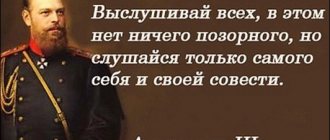Legendary speeches of lawyer F.N. Plevako
Legendary speeches of lawyer Plevako F.N.
Fedor Nikiforovich Plevako, one of the most famous Russian lawyers, whom
contemporaries nicknamed him “Moscow Chrysostom”.
Here are several examples of Plevako's famous eloquence.
Don't dare to believe!
One Russian landowner ceded part of his land to the peasants without legally formalizing it in any way. Many years later he changed his mind and took the land back. Outraged peasants started riots. They were put on trial. The jury consisted of neighboring landowners; the rebels were threatened with hard labor. The famous lawyer Plevako undertook to defend them. He remained silent throughout the entire process, and at the end he demanded that the peasants be punished even more severely. "For what?" - the judge did not understand. Answer: “To forever wean the peasants from believing the word of a Russian nobleman.” Some of the peasants were acquitted, the rest received minor punishments.
But it could have been worse!
Plevako had the habit of beginning his speech in court with the phrase: “Gentlemen, it could have been worse.” And no matter what case the lawyer came across, he did not change his phrase. One day Plevako undertook to defend a man who raped his own daughter. The hall was packed, everyone was waiting for the lawyer to begin his defense speech.
Is it really from your favorite phrase? Incredible. But Plevako stood up and calmly said: “Gentlemen, it could have been worse.” And here the judge himself could not stand it. “What,” he cried, “tell me, what could be worse than this abomination?” “Your honor,” asked Plevako, “what if he raped your daughter?”
Protection of innocence.
One girl came to Moscow from the provinces and stayed at the Moscow hotel "Montenegro", the manager of which was a certain Frolov. She occupied a separate room on the third floor. It was already past midnight when the tipsy Frolov decided to pay her a “visit.”
But the girl, awakened by a knock, refused to let him in, after which, on Frolov’s orders, floor polishers began to break down the door. At that moment, when the door cracked, a girl in only a shirt, in 25-degree frost, jumped out of the window. Luckily for her, there was a lot of snow in the yard, and she didn’t hurt herself to death, although she did break her arm.
When considering the case in court, the prosecutor “naively” refused to understand why the girl was so scared and why she jumped out of the window at the risk of her life. The prosecutor's confusion was resolved by Plevako, who defended the interests of the victim. His speech was brief and boiled down to the following parallel:
“In distant Siberia,” said Plevako, “in the dense taiga there is an animal, which fate has awarded with a fur coat as white as snow. This is an ermine. When he is fleeing from an enemy who is ready to tear him to pieces, and on the way he encounters a dirty puddle that he has no time to pass, he prefers to surrender to the enemy than to dirty his snow-white fur coat. And I understand why the victim jumped out the window.” Without adding another word, Plevako sat down. However, more was not required of him. The judges sentenced Frolov to death.
Pleasure.
One day F.N. Plevako recalled. “Once a rich Moscow merchant turned to him for help. Plevako says: “I heard about this merchant. I decided that I would charge such a fee that the merchant would be horrified. And not only was he not surprised, but he also said: “Just win my case. I’ll pay what you said, and I’ll also give you pleasure.” - “What kind of pleasure?” - “Win the case, you’ll see.”
I won the case. The merchant paid the fee. I reminded him of the promised pleasure. The merchant says: “On Sunday, at about ten in the morning, I’ll pick you up, let’s go.” - “Where to this early?” - “You’ll see, you’ll see.”
It's Sunday. The merchant came to pick me up. We are going to Zamoskvorechye. I wonder where he's taking me. There are no restaurants here, no gypsies. And the time is not right for these things. We drove down some side streets. There are no residential buildings around, only barns and warehouses. We arrived at some warehouse. A little man is standing at the gate. Either a watchman or a team worker. They got off. Kupchina asks the man:
"Ready?" - “That’s right, your lordship” - “Lead...” We walk through the yard. The little man opened a door. We walked in, looked and didn’t understand anything. A huge room, shelves along the walls, dishes on the shelves. The merchant sent the peasant out, stripped off his fur coat and offered to take it off for me. I undress. The merchant went to the corner, took two hefty clubs, gave one of them to me and said:
"Begin." - “What should we start?” - "Like what? Break the dishes!” - “Why beat her?” The merchant smiled. “Start, you’ll understand why...” The merchant walked up to the shelves and with one blow broke a bunch of dishes. I hit too. Broke it too. We began to break the dishes and, imagine, I went into such a rage and began to smash the dishes with such fury with a club that I’m ashamed to even remember.
Imagine that I really experienced some kind of wild but acute pleasure and could not calm down until the merchant and I broke everything down to the last cup. When it was all over, the merchant asked me: “Well, did you enjoy it?” I had to admit that I received it.”
"20 minutes"
Lawyer F.N. Plevako’s defense of the owner of a small shop, a semi-literate woman, who violated the rules on trading hours and closed the trade 20 minutes later than expected, on the eve of some religious holiday, is very well known. The court hearing in her case was scheduled for 10 o'clock. The court left 10 minutes late. Everyone was present, except for the defender - Plevako. The chairman of the court ordered to find Plevako. About 10 minutes later, Plevako slowly entered the hall, calmly sat down in the place of protection and opened his briefcase. The chairman of the court reprimanded him for being late. Then Plevako pulled out his watch, looked at it and stated that it was only five minutes past ten on his watch. The chairman pointed out to him that it was already 20 minutes past ten on the wall clock. Plevako asked the chairman: “What time is it on your watch, Your Excellency?” The chairman looked and replied:
- At my fifteen minutes past ten. Plevako turned to the prosecutor:
- What about your watch, Mr. Prosecutor?
The prosecutor, clearly wanting to cause trouble for the defense attorney, replied with a malicious smile:
“It’s already twenty-five minutes past ten on my watch.”
He could not know what trap Plevako had set for him and how much he, the prosecutor, helped the defense.
The judicial investigation ended very quickly. Witnesses confirmed that the defendant closed the shop 20 minutes late. The prosecutor asked to find the defendant guilty. The floor was given to Plevako. The speech lasted two minutes. He declared:
— The defendant was really 20 minutes late. But, gentlemen of the jury, she is an old woman, illiterate, and doesn’t know much about watches. You and I are literate and intelligent people. How are things going with your watches? When the wall clock shows 20 minutes, Mr. Chairman has 15 minutes, and Mr. Prosecutor’s clock has 25 minutes. Of course, Mr. Prosecutor has the most reliable watch. So my watch was 20 minutes slow, so I was 20 minutes late. And I always considered my watch to be very accurate, because I have a gold, Moser watch.
So if Mr. Chairman, according to the prosecutor’s watch, opened the hearing 15 minutes late, and the defense attorney arrived 20 minutes later, then how can you demand that an illiterate tradeswoman have a better watch and have a better understanding of time than the prosecutor and I?
The jury deliberated for one minute and acquitted the defendant.
"The Omen"
To the great Russian lawyer F.N. Plevako is credited with frequently using the religious mood of jurors in the interests of clients. Once, speaking in a provincial district court, he agreed with the bell ringer of the local church that he would start ringing the gospel for mass with special accuracy.
The speech of the famous lawyer lasted several hours, and at the end F.N. Plevako exclaimed: If my client is innocent, the Lord will give a sign about it!
And then the bells rang. The jurors crossed themselves. The meeting lasted several minutes, and the foreman announced a not guilty verdict.
I took off my shoes!
In addition to the story about the famous lawyer Plevako. He defends a man who has been accused of rape by a prostitute and is trying to get a significant amount from him in court for the injury he caused. Facts of the case: the plaintiff claims that the defendant lured her to a hotel room and raped her there. The man declares that everything was by good agreement. The last word goes to Plevako.
“Gentlemen of the jury,” he declares. “If you sentence my client to a fine, then I ask you to deduct from this amount the cost of washing the sheets that the plaintiff soiled with her shoes.”
The prostitute jumps up and shouts: “It’s not true! I took off my shoes!!!”
There is laughter in the hall. The defendant is acquitted.
The Gruzinsky case.
This case was considered by the Ostrogozhsky District Court on September 29-30, 1883. Prince G.I. Gruzinsky was accused of the premeditated murder of his children’s former tutor, who later managed the estate of Gruzinsky’s wife, E.F. Schmidt.
The preliminary investigation established the following. E.F. Schmidt, invited by Gruzinsky last. After Gruzinsky demanded that his wife end all relations as a tutor, very quickly became close to his wife with the tutor, and he himself was fired, the wife declared the impossibility of further living with Gruzinsky and demanded the allocation of part of the property belonging to her. Having settled in the estate allocated to her, she invited E.F. to join her as her manager. Schmidt. After the partition, Gruzinsky’s two children lived for some time with their mother in the same estate where Schmidt was the manager. Schmidt often used this to take revenge on Gruzinsky. The latter had limited opportunities for meetings with children; the children were told a lot of incriminating things about Gruzinsky. As a result, being constantly in a tense nervous state during meetings with Schmidt and with children, Gruzinsky killed Schmidt during one of these meetings, shooting him several times with a pistol.
Plevako, defending the defendant, very consistently proves the absence of intent in his actions and the need to qualify them as committed in a state of insanity. He focuses on the prince’s feelings at the time of the crime, his relationship with his wife, and his love for his children. He tells the story of the prince, about his meeting with the “clerk from the store”, about his relationship with the old princess, about how the prince took care of his wife and children. The eldest son was growing up, the prince was taking him to St. Petersburg, to school. There he falls ill with a fever. The prince experiences three attacks, during which he manages to return to Moscow - “A tenderly loving father and husband want to see his family.”
“It was then that the prince, who had not yet left his bed, had to experience terrible grief. Once he hears—patients are so sensitive—a conversation between Schmidt and his wife in the next room: they are apparently arguing; but their quarrel is so strange: as if they were scolding their own people, and not strangers, then again the speeches are peaceful..., uncomfortable... The prince gets up, gathers his strength..., walks when no one expected him, when they thought that he was chained to the bed... And what. The dear ones scold - they just amuse themselves: Schmidt and the princess are together, it’s not good together...
The prince fainted and lay on the floor all night. Those caught fled, not even thinking of sending help to the sick person. The prince could not kill the enemy, destroy him, he was weak... He only accepted misfortune into an open heart so that he would never know separation from him.”
Plevako claims that he would not yet have dared to accuse the princess and Schmidt, to condemn them to the prince’s sacrifice, if they had left, had not boasted of their love, had not insulted him, had not extorted money from him, that this “would have been the hypocrisy of the word.”
The princess lives in her half of the estate. Then she leaves, leaving the children with Schmidt. The prince is angry: he takes the children. But here something irreparable happens. “Schmidt, taking advantage of the fact that the children’s underwear is in the princess’s house where he lives, rejects the demand with an oath and sends an answer that without 300 rubles. The pledge will not give the prince two shirts and two pants for the children. A hanger-on, a hired lover, stands between the father and the children and dares to call him a man who can waste children’s underwear, takes care of the children and demands 300 rubles from the father. collateral Not only the father to whom this is said, but the stranger who hears about it, his hair stands on end!” The next morning the prince saw children in wrinkled shirts. “My father’s heart sank. He turned away from these talking eyes and - which a father’s love will not do - went out into the hallway, got into the carriage prepared for him for the trip and drove off... went to ask his rival, enduring shame and humiliation, for a shirt for his children.”
At night, according to witnesses, Schmidt loaded the guns. The prince had a pistol with him, but this was a habit, not an intention. “I claim,” said Plevako, “that an ambush awaits him there. Linen, refusal, bail, loaded guns of large and small caliber - everything speaks for my thought.”
He goes to Schmidt. “Of course, his soul could not help but be indignant when he saw the nest of his enemies and began to approach it. Here it is - a place where, in the hours of his grief and suffering, they - his enemies - laugh and rejoice at his misfortune. Here it is - a lair where the honor of the family, his honor, and all the interests of his children are sacrificed to the animal voluptuousness of the scoundrel. Here it is - a place where not only did they take away his present, they also took away his past happiness, poisoning him with suspicions...
God forbid we experience such moments!
In this mood he drives, approaches the house, knocks on the door. door.
They won't let him in. The footman speaks of the order not to accept.
The prince conveys that he doesn’t need anything other than linen.
But instead of fulfilling his legal demand, instead of finally politely refusing, he hears abuse, abuse from the lips of his wife’s lover, directed at him, who does not do any insult on his part.
Have you heard about this swearing: “Let the scoundrel leave, don’t you dare knock, this is my house!” Get out, I'll shoot."
The prince's whole being was indignant. The enemy stood close and laughed so brazenly. The prince could have known that he was armed from his family, who had heard from Tsybulin. And the prince could not help but believe that he was capable of everything evil.”
He shoots. “But listen, gentlemen,” says the defender, “was there a living place in his soul at that terrible moment?” “The prince could not cope with these feelings. They are too legal, these for them” “The husband sees a man ready to desecrate the purity of the marriage bed; the father is present at the scene of the seduction of his daughter; the high priest sees the impending blasphemy - and, besides them, there is no one to save the law and the shrine. What rises in their souls is not a vicious feeling of malice, but a righteous feeling of vengeance and defense of the violated right. It is legal, it is holy; “If it doesn’t rise, they are despicable people, pimps, blasphemers!”
Concluding his speech, Fyodor Nikiforovich said: “Oh, how happy I would be if, having measured and compared with your own understanding the strength of his patience and struggle with himself, and the force of the oppression over him of the soul-disturbing pictures of his family misfortune, you admitted that he cannot be charged with the charges brought against him, and his defender is entirely to blame for his insufficient ability to carry out the task he has taken upon himself...”
The jury returned a not guilty verdict, finding that the crime was committed in a state of insanity.
Poor Russia!
One high-ranking noblewoman, being bankrupt, having lost her husband and son, deprived of her estate for debts, lived as a hanger-on with some lady, then rented a room and, since she did not have a kettle to boil water, she stole it from the market. And she was tried by the crown court (as a noblewoman).
The prosecutor, seeing Plevako, decided: “Yeah. Now he will play on pity, on the fact that this is a poor woman who lost her husband, went bankrupt... I’ll play on this too.” He came out and said: “Of course, I feel sorry for the woman, she lost her husband, son, etc., my heart bleeds, I myself am ready to go to prison in her place, but... Gentlemen, crown court. The point is, in principle, she took aim at the sacred foundation of our society - private property. Today she stole a teapot, and tomorrow a cart, and the day after tomorrow something else. This is the destruction of the foundations of our state. And since everything starts small and grows into something huge, that’s why I ask her to be punished, otherwise it threatens our state with huge disasters, the destruction of its foundations.”
The prosecutor received applause. Plevako came out to his place and suddenly turned around, went to the window, stood for a long time, looked. The audience is tense: what is he watching? Plevako came out and said:
“Dear Crown Court! Russia suffered so many troubles: Batu trampled her with horses, and the Teutonic knights raped Mother Russia, twelve languages led by Napoleon Bonaparte came and burned Moscow. Russia has suffered so many troubles, but every time it has risen, risen like a phoenix from the ashes. And now there’s a new misfortune: a woman stole the teapot. Poor Russia! What’s going to happen to you now?”
The audience laughed. The woman was acquitted.
"Absolution of Sins"
He once defended an elderly priest accused of adultery and theft. By all appearances, the defendant could not count on the favor of the jury. The prosecutor convincingly described the depth of the fall of the clergyman, mired in sins. Finally, Plevako rose from his place. His speech was brief: “Gentlemen of the jury! The matter is clear. The prosecutor is absolutely right in everything. The defendant committed all these crimes and confessed to them. What is there to argue about? But I draw your attention to this. A man sits in front of you who has absolved you of your sins in confession for thirty years. Now he is waiting from you: will you forgive him his sin?”
There is no need to clarify that the priest was acquitted.




